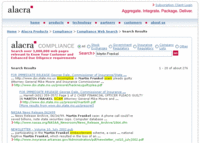GooTube
![]() I've refrained from posting about the Google-YouTube marriage, knowing that thousands of bloggers and media, most (all?) much smarter than I, were covering it like FoxNews covered the Natalie Holloway story.
I've refrained from posting about the Google-YouTube marriage, knowing that thousands of bloggers and media, most (all?) much smarter than I, were covering it like FoxNews covered the Natalie Holloway story.
That said, I'm surprised that the debate continues as to whether Google overpaid.
The basic premise seems to be that valuations of web 2.0 sites were getting astronomical and that the acquirers could never achieve a return on their investment. I'd buy that argument if it were a traditional media company buying it, but it doesn't hold water in this case. There are three reasons why Google was uniquely well-suited to make this acquisition:
- Google is spending about 2% of its already frothy market cap to buy this with stock. That's different from when News Corp spent $580M in cash to buy MySpace (which, by the way, seems to be working quite well for them). Google knows better than almost anyone how to monetize the YouTube traffic, so giving up 2% of its shares for the million or so unique daily visitors to YouTube looks pretty good. And while uniques are important, a key metric is the amount of time spent on a site, and YouTube will dramatically increase the average time spent per user.
- The biggest argument against the acquisition, as highlighted by Mark Cuban's Blog Maverick, is that lawsuits will bog the company down and, if copyrighted content were removed, there'd be little left of value. Fair enough. But, Google's gained quite a bit of experience in negotiating with the publishing community and I think they'll get most of the companies to play ball. After all, while some overprotective companies like Disney might sue, others like Viacom's Comedy Channel know that the value of having a 3-minute clip from the Daily Show is incredibly valuable free advertising.
- The other challenge with YouTube is that delivering all that rich media content takes a lot of servers and bandwidth. There aren't many companies that understand web infrastructure better than Google, so I doubt they'll have many challenges in this area.
Yes, there are many reasons why a traditional media company might have been afraid of the risks involved in acquiring a property like YouTube. But for Google, it seems like a no-brainer.



















